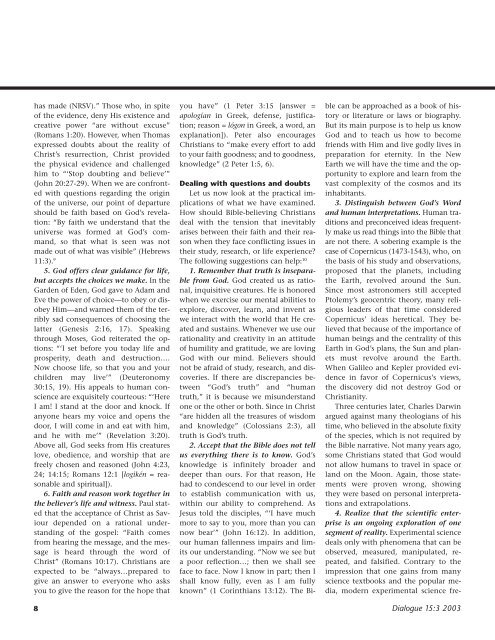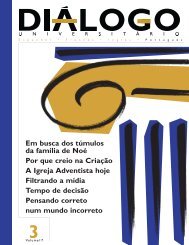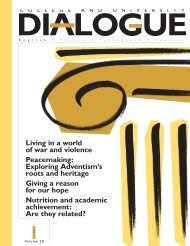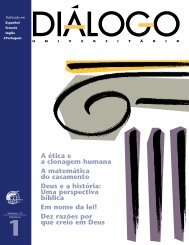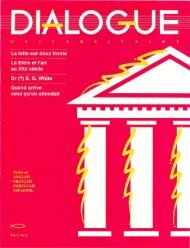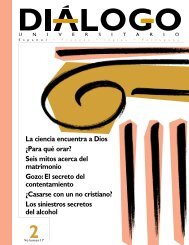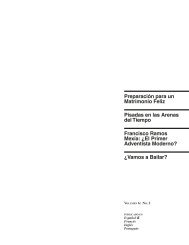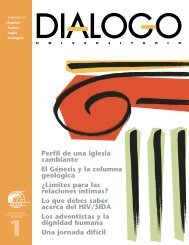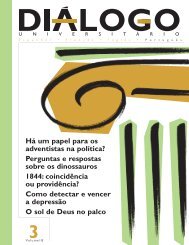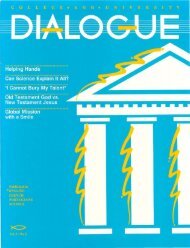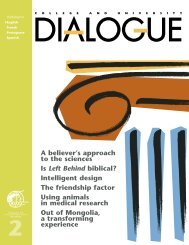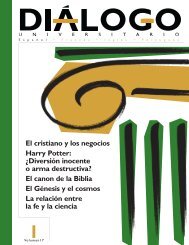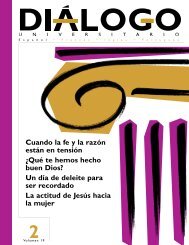Faith, reason, and the educated Christian Creationism - College and ...
Faith, reason, and the educated Christian Creationism - College and ...
Faith, reason, and the educated Christian Creationism - College and ...
You also want an ePaper? Increase the reach of your titles
YUMPU automatically turns print PDFs into web optimized ePapers that Google loves.
has made (NRSV).” Those who, in spite<br />
of <strong>the</strong> evidence, deny His existence <strong>and</strong><br />
creative power “are without excuse”<br />
(Romans 1:20). However, when Thomas<br />
expressed doubts about <strong>the</strong> reality of<br />
Christ’s resurrection, Christ provided<br />
<strong>the</strong> physical evidence <strong>and</strong> challenged<br />
him to “‘Stop doubting <strong>and</strong> believe’”<br />
(John 20:27-29). When we are confronted<br />
with questions regarding <strong>the</strong> origin<br />
of <strong>the</strong> universe, our point of departure<br />
should be faith based on God’s revelation:<br />
“By faith we underst<strong>and</strong> that <strong>the</strong><br />
universe was formed at God’s comm<strong>and</strong>,<br />
so that what is seen was not<br />
made out of what was visible” (Hebrews<br />
11:3). 9<br />
5. God offers clear guidance for life,<br />
but accepts <strong>the</strong> choices we make. In <strong>the</strong><br />
Garden of Eden, God gave to Adam <strong>and</strong><br />
Eve <strong>the</strong> power of choice—to obey or disobey<br />
Him—<strong>and</strong> warned <strong>the</strong>m of <strong>the</strong> terribly<br />
sad consequences of choosing <strong>the</strong><br />
latter (Genesis 2:16, 17). Speaking<br />
through Moses, God reiterated <strong>the</strong> options:<br />
“‘I set before you today life <strong>and</strong><br />
prosperity, death <strong>and</strong> destruction….<br />
Now choose life, so that you <strong>and</strong> your<br />
children may live’” (Deuteronomy<br />
30:15, 19). His appeals to human conscience<br />
are exquisitely courteous: “‘Here<br />
I am! I st<strong>and</strong> at <strong>the</strong> door <strong>and</strong> knock. If<br />
anyone hears my voice <strong>and</strong> opens <strong>the</strong><br />
door, I will come in <strong>and</strong> eat with him,<br />
<strong>and</strong> he with me’” (Revelation 3:20).<br />
Above all, God seeks from His creatures<br />
love, obedience, <strong>and</strong> worship that are<br />
freely chosen <strong>and</strong> <strong>reason</strong>ed (John 4:23,<br />
24; 14:15; Romans 12:1 [logikén = <strong>reason</strong>able<br />
<strong>and</strong> spiritual]).<br />
6. <strong>Faith</strong> <strong>and</strong> <strong>reason</strong> work toge<strong>the</strong>r in<br />
<strong>the</strong> believer’s life <strong>and</strong> witness. Paul stated<br />
that <strong>the</strong> acceptance of Christ as Saviour<br />
depended on a rational underst<strong>and</strong>ing<br />
of <strong>the</strong> gospel: “<strong>Faith</strong> comes<br />
from hearing <strong>the</strong> message, <strong>and</strong> <strong>the</strong> message<br />
is heard through <strong>the</strong> word of<br />
Christ” (Romans 10:17). <strong>Christian</strong>s are<br />
expected to be “always…prepared to<br />
give an answer to everyone who asks<br />
you to give <strong>the</strong> <strong>reason</strong> for <strong>the</strong> hope that<br />
you have” (1 Peter 3:15 [answer =<br />
apologían in Greek, defense, justification;<br />
<strong>reason</strong> = lógon in Greek, a word, an<br />
explanation]). Peter also encourages<br />
<strong>Christian</strong>s to “make every effort to add<br />
to your faith goodness; <strong>and</strong> to goodness,<br />
knowledge” (2 Peter 1:5, 6).<br />
Dealing with questions <strong>and</strong> doubts<br />
Let us now look at <strong>the</strong> practical implications<br />
of what we have examined.<br />
How should Bible-believing <strong>Christian</strong>s<br />
deal with <strong>the</strong> tension that inevitably<br />
arises between <strong>the</strong>ir faith <strong>and</strong> <strong>the</strong>ir <strong>reason</strong><br />
when <strong>the</strong>y face conflicting issues in<br />
<strong>the</strong>ir study, research, or life experience?<br />
The following suggestions can help: 10<br />
1. Remember that truth is inseparable<br />
from God. God created us as rational,<br />
inquisitive creatures. He is honored<br />
when we exercise our mental abilities to<br />
explore, discover, learn, <strong>and</strong> invent as<br />
we interact with <strong>the</strong> world that He created<br />
<strong>and</strong> sustains. Whenever we use our<br />
rationality <strong>and</strong> creativity in an attitude<br />
of humility <strong>and</strong> gratitude, we are loving<br />
God with our mind. Believers should<br />
not be afraid of study, research, <strong>and</strong> discoveries.<br />
If <strong>the</strong>re are discrepancies between<br />
“God’s truth” <strong>and</strong> “human<br />
truth,” it is because we misunderst<strong>and</strong><br />
one or <strong>the</strong> o<strong>the</strong>r or both. Since in Christ<br />
“are hidden all <strong>the</strong> treasures of wisdom<br />
<strong>and</strong> knowledge” (Colossians 2:3), all<br />
truth is God’s truth.<br />
2. Accept that <strong>the</strong> Bible does not tell<br />
us everything <strong>the</strong>re is to know. God’s<br />
knowledge is infinitely broader <strong>and</strong><br />
deeper than ours. For that <strong>reason</strong>, He<br />
had to condescend to our level in order<br />
to establish communication with us,<br />
within our ability to comprehend. As<br />
Jesus told <strong>the</strong> disciples, “‘I have much<br />
more to say to you, more than you can<br />
now bear’” (John 16:12). In addition,<br />
our human fallenness impairs <strong>and</strong> limits<br />
our underst<strong>and</strong>ing. “Now we see but<br />
a poor reflection…; <strong>the</strong>n we shall see<br />
face to face. Now I know in part; <strong>the</strong>n I<br />
shall know fully, even as I am fully<br />
known” (1 Corinthians 13:12). The Bible<br />
can be approached as a book of history<br />
or literature or laws or biography.<br />
But its main purpose is to help us know<br />
God <strong>and</strong> to teach us how to become<br />
friends with Him <strong>and</strong> live godly lives in<br />
preparation for eternity. In <strong>the</strong> New<br />
Earth we will have <strong>the</strong> time <strong>and</strong> <strong>the</strong> opportunity<br />
to explore <strong>and</strong> learn from <strong>the</strong><br />
vast complexity of <strong>the</strong> cosmos <strong>and</strong> its<br />
inhabitants.<br />
3. Distinguish between God’s Word<br />
<strong>and</strong> human interpretations. Human traditions<br />
<strong>and</strong> preconceived ideas frequently<br />
make us read things into <strong>the</strong> Bible that<br />
are not <strong>the</strong>re. A sobering example is <strong>the</strong><br />
case of Copernicus (1473-1543), who, on<br />
<strong>the</strong> basis of his study <strong>and</strong> observations,<br />
proposed that <strong>the</strong> planets, including<br />
<strong>the</strong> Earth, revolved around <strong>the</strong> Sun.<br />
Since most astronomers still accepted<br />
Ptolemy’s geocentric <strong>the</strong>ory, many religious<br />
leaders of that time considered<br />
Copernicus’ ideas heretical. They believed<br />
that because of <strong>the</strong> importance of<br />
human beings <strong>and</strong> <strong>the</strong> centrality of this<br />
Earth in God’s plans, <strong>the</strong> Sun <strong>and</strong> planets<br />
must revolve around <strong>the</strong> Earth.<br />
When Galileo <strong>and</strong> Kepler provided evidence<br />
in favor of Copernicus’s views,<br />
<strong>the</strong> discovery did not destroy God or<br />
<strong>Christian</strong>ity.<br />
Three centuries later, Charles Darwin<br />
argued against many <strong>the</strong>ologians of his<br />
time, who believed in <strong>the</strong> absolute fixity<br />
of <strong>the</strong> species, which is not required by<br />
<strong>the</strong> Bible narrative. Not many years ago,<br />
some <strong>Christian</strong>s stated that God would<br />
not allow humans to travel in space or<br />
l<strong>and</strong> on <strong>the</strong> Moon. Again, those statements<br />
were proven wrong, showing<br />
<strong>the</strong>y were based on personal interpretations<br />
<strong>and</strong> extrapolations.<br />
4. Realize that <strong>the</strong> scientific enterprise<br />
is an ongoing exploration of one<br />
segment of reality. Experimental science<br />
deals only with phenomena that can be<br />
observed, measured, manipulated, repeated,<br />
<strong>and</strong> falsified. Contrary to <strong>the</strong><br />
impression that one gains from many<br />
science textbooks <strong>and</strong> <strong>the</strong> popular media,<br />
modern experimental science fre-<br />
8 Dialogue 15:3 2003


